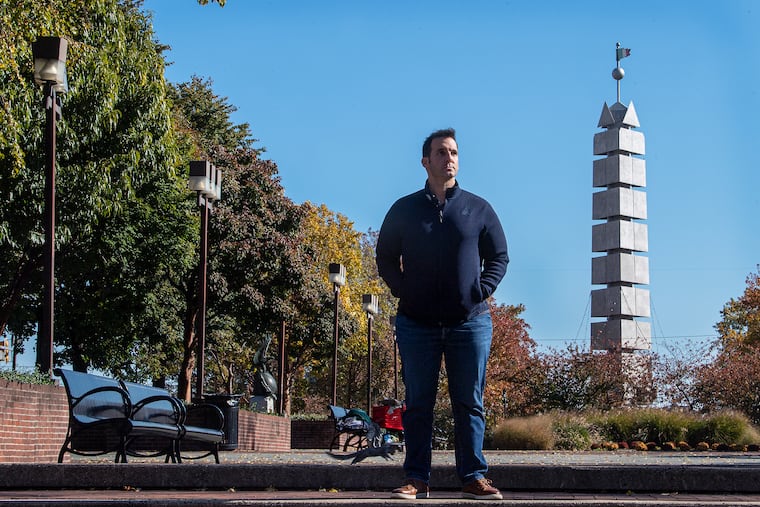Pennsylvania families deserve a place to gather and honor the dead from wars in Afghanistan and Iraq | Jenice Armstrong
Some veterans want to create a monument near Penn’s Landing in memory of local servicemembers killed in action and call it the Pennsylvania Iraq-Afghanistan Global War on Terrorism Memorial.

Monday marked my first visit ever to Philadelphia’s Korean War Memorial.
That honors an armed conflict that I never really knew all that much about, even though I had grown up listening to my father and uncle trade greetings in Korean and talk about their experiences during what is sometimes referred to as one of America’s forgotten wars. My uncle, then a newly commissioned Black officer in the Second Infantry Division, had led a mostly white combat squadron on the front lines. He lost part of his right leg below the knee; my father, a sergeant who had recently graduated from college, lost some of his hearing.
Both returned to the Jim Crow South forever marked by their time in the Army, which had been racially desegregated in 1948. Decades later, when the Korean War Memorial was dedicated in Washington in 1995, my dad proudly donned his “Korean War Veteran” baseball cap and attended the ceremony on the National Mall.
Yet, there I was Monday, standing in front of the shiny slabs of granite that make up our local Korean War Memorial in Society Hill’s Foglietta Plaza, reminding myself about the events that led to it.
That’s how it is with wars. Time passes. Memories fade. Combat veterans die, taking their stories with them. It’s up to the living to keep alive the legacies of those killed in action, which is what David Henderson, a major in the Army Reserves, is out to do. He and a group of local veterans want to create a monument near Penn’s Landing in memory of local service members killed in action this century and call it the Pennsylvania Iraq-Afghanistan Global War on Terrorism Memorial.
» READ MORE: For three decades, one man, now 75, has cared for Philly’s Vietnam and Korean War memorials
They spent four years raising $205,000 for the proposed monument. More than 500 people have signed a Change.org petition to support it.
Henderson and I met at Foglietta Plaza on Monday to discuss the idea because organizers ideally want it situated near the Korean War Memorial and the nearby Vietnam Veterans Memorial, just across Spruce Street. They envision something similar in scale to the Korean War Memorial, possibly with six different slabs of granite of gradually varying heights.
According to city officials, it would have to be reviewed by the Office of Arts, Culture and the Creative Economy and then by the Philadelphia Arts Commission. Henderson submitted the proposal late Wednesday and is already braced for possible pushback. The Society Hill Civic Association has hired Olin, a nationally known landscape architectural firm, to look into ways to improve the plaza overall.
“I believe that usage for additional memorials is among the possibilities,” Larry Spector, the association’s president, wrote in an email. “The memorial for those killed in Afghanistan would certainly qualify, although we expect that Olin would opine on whether this memorial should be to the exclusion of other possible improvements to the Plaza. We expect a report from Olin by the end of this year.”
Hopefully, it won’t take long to get it approved.
We have such short memories. The last U.S. troops had barely left Afghanistan before we had turned our attention elsewhere. More than 7,000 U.S. service members died in that country and Iraq.
Meanwhile, roughly one out of every four Americans wasn’t even born when it all began. Fast-forward 50 years and many won’t remember why American troops were even sent there in the first place.
“It’s already happening,” said Henderson, who served two tours in Iraq and one in Afghanistan. “I get people who tell me, ‘I thought we left there years ago.’”
If his group prevails, long after we’re gone the Pennsylvania Iraq-Afghanistan Global War on Terrorism Memorial will be here and list the names of the approximately 300 local service members killed in action.
Another monument might not change anything. However, it would serve as a touchstone — as the Korean War Memorial did for me this week. I keep my father’s military insignia in my home office as well as a copy of We Were There: Voices of African American Veterans, From World War II to the War in Iraq, by journalist and professor Yvonne Latty, which shares my uncle’s heroic exploits during the Battle on Bloody Ridge in October 1951.
Eventually, my uncle’s memory faded and his frequent recollections dwindled. The last time Charles R. Armstrong, who died last year at the age of 93, mentioned anything to me about Korea, he was sitting on his bed in a nursing home just outside Washington.
He asked, “Who took Bloody Ridge?” I looked him in the eyes and said, “You did.”
He smiled, pleased that I remembered.